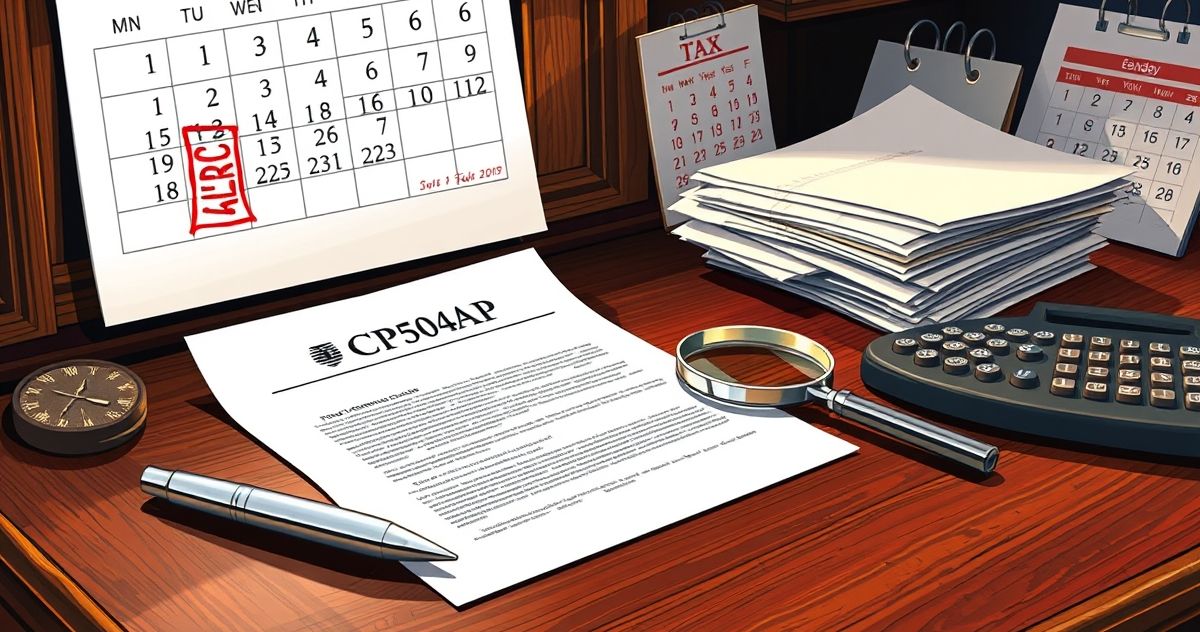Understanding the CP504AP Notice
The CP504AP Notice is a formal communication from the Internal Revenue Service (IRS) typically dispatched to taxpayers with outstanding tax liabilities. The notice is more than just a reminder—it represents a pivotal step in the IRS’s collection process aimed at securing tax compliance while alerting the taxpayer to the imminent risk associated with late payment. The primary purpose of this notice is to inform individuals or businesses about their unpaid tax bills, warn them of the pending actions, and encourage immediate payment to avoid further complications.
Primary Purpose of CP504AP Notice
The essential function of the CP504AP Notice is to serve as a formal alert regarding an outstanding tax balance that remains unpaid. It is often referred to as the “Notice of Intent to Levy,” a crucial indicator of the IRS’s intention to seize property or rights to property if the debt is not settled promptly. The issuance of this notice signifies that the IRS has made several attempts to notify the taxpayer of their dues but has yet to receive any payment or correspondence.
Key Features of the CP504AP Notice
- Statement of Account: The notice provides an updated account statement, detailing the main tax amount, any accrued penalties, and interest, offering the taxpayer a comprehensive view of their total obligation.
- Demand for Payment: It explicitly demands full payment by a specific date to prevent further enforcement actions.
- Levy Warning: The notice serves as a final warning before assets can be levied, including wages, bank accounts, state tax refunds, and more.
- Contact Information: The notice includes channels through which the taxpayer can contact the IRS to discuss their account, set up payment plans, or dispute the claim if necessary.
Relevant Filing or Compliance Requirements
Receiving a CP504AP Notice underscores the importance of understanding and adhering to IRS compliance protocols, particularly in filing and payment of taxes:
- Timely Filing: Staying compliant begins with the timely filing of tax returns, ensuring that all submitted documentation is accurate and complete to prevent discrepancies and penalties.
- Prompt Payments: Meeting payment deadlines is crucial as failing to do so results in notices like the CP504AP, which warns of further action. Taxpayers are encouraged to either pay in full or arrange for an installment agreement before receiving this notice.
- Responding to Notices: Engaging with IRS notices promptly is critical. Ignoring warnings can escalate the severity of repercussions.
Penalties or Consequences for Non-Compliance
Non-compliance with the CP504AP Notice can have alarming repercussions. The IRS is empowered to levy and seize assets, enforce wage garnishments, and place liens on properties, making it imperative for taxpayers to heed to these notices:
- Asset Seizure: Following the CP504AP, the IRS may begin seizing assets including bank accounts and real property to satisfy the outstanding tax debt.
- Wage Garnishment: Earnings may be directly garnished until the debt is paid off, significantly reducing disposable income.
- Additional Penalties: Past due amounts continue to accrue interest, and an additional failure-to-pay penalty may be imposed, exacerbating financial burdens.
Importance in Tax Resolution and Financial Compliance
The CP504AP Notice plays a critical role in tax resolution and upholding financial compliance. Addressing this notice promptly is the first step towards averting aggressive IRS collection activities. Financial advisors often recommend treating the CP504AP Notice as a crucial juncture, urging taxpayers to:
- Negotiate with the IRS: Engaging in timely dialogue can open avenues for negotiations, such as installment agreements or offers in compromise.
- Review Tax Position: Evaluate past tax filings to identify errors or opportunities that might minimize liabilities, providing a path to resolve the notice more effectively.
- Seek Professional Guidance: Consulting a tax professional may offer insights to devise strategies for settling dues without exhaustive financial implications.
In summary, the CP504AP Notice is not only a call to action to pay overdue taxes but also a beacon warning of the potential escalation of collection efforts by the IRS. Taxpayers who engage proactively upon receiving this notice usually find themselves better positioned to manage their tax affairs, secure financial stability, and maintain their standing with the IRS.

